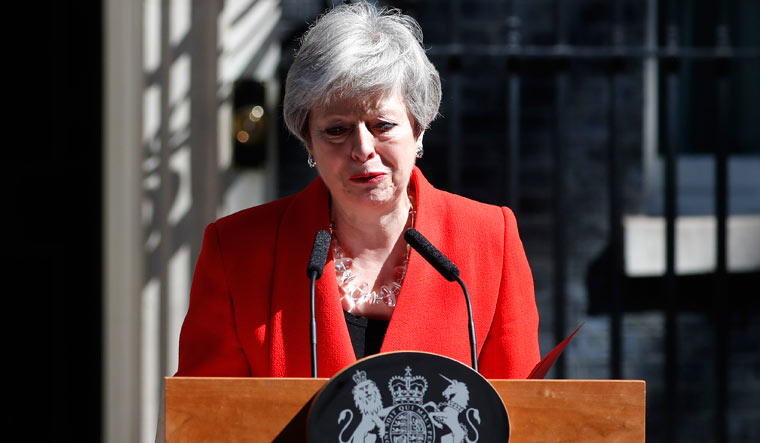British Prime Minister Theresa May announced on Friday that she will step aside as Conservative leader after facing immense pressure from her own party for failing to convince MPs to support her Brexit deal.
May said that June 7 will be the day that she steps down bringing her three-year premiership to an end. A new prime minister will be saddled with the responsibility to break the impasse over Britain's departure from the European Union.
"It is now clear to me that it is in the best interests of the country for a new prime minister to lead that effort. So I am today announcing that I will resign as leader of the Conservative and Unionist Party on Friday 7 June," May said at Downing Street.
May said that it had been “the honour of my life” to serve as Britain's second woman prime minister. She broke down and said that she would leave with no ill will, but “with enormous and enduring gratitude”.
“It is and will always remain a matter of deep regret to me that I have not been able to deliver Brexit," she said. May's failure in getting her ministers to approve her withdrawal deal piled up tremendous pressure on her to quit.
The Brexit deal she presented in parliament were rejected three times, prompting Britain to seek an extension to the March 29 deadline.
May had a piece of advice to her successor, who she said will have to honour the result of the (2016) referendum. “To succeed, he or she will have to find consensus in parliament where I have not. Such a consensus can only be reached if those on all sides of the debate are willing to compromise.”
May is expected to stay on in Downing Street as caretaker prime minister to oversee the state visit of US President Donald Trump during June 3-5. A new Tory leader will be in place by the end of July.
Meanwhile, reactions to May's resignation started pouring in, with Irish foreign minister Simon Coveney saying the EU will not offer a better deal to the new prime minister.
“From my perspective, I don't see the European Union offering any new prime minister a better or very different deal to what was on offer to Theresa May. This idea that a new prime minister will be a tougher negotiator and will put it up to the EU and get a much better deal for Britain? That's not how the EU works,” Coveney said.
Conservative lawmaker Boris Johnson, who is most likely to replace May, tweeted that it was time to “follow her urgings: to come together and deliver Brexit”. “A very dignified statement from @theresa_may. Thank you for your stoical service to our country and the Conservative Party.”
(With inputs from agencies)


